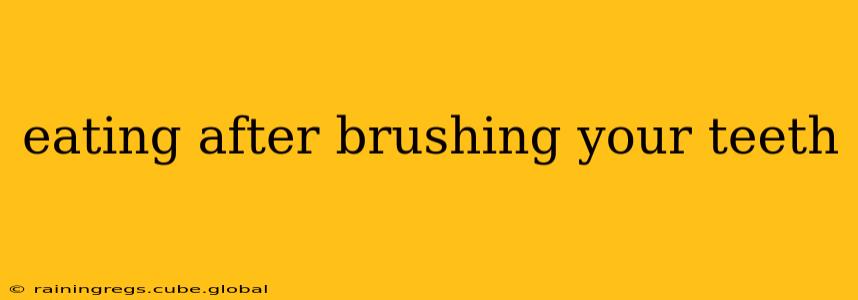Brushing your teeth is a crucial part of maintaining good oral hygiene. But what happens when you eat or drink after that fresh, minty clean feeling? Many people wonder if eating after brushing is detrimental to their dental health. The short answer is: it depends. While it's not inherently bad, there are certain considerations to keep in mind. This article will delve into the effects of eating after brushing, addressing common concerns and offering practical advice to maintain optimal oral health.
Is it bad to eat after brushing your teeth?
The impact of eating after brushing your teeth depends largely on what you consume. Brushing removes food particles and plaque, leaving your teeth temporarily more vulnerable to acid erosion. Highly acidic foods and drinks, consumed immediately after brushing, can wear away tooth enamel more easily. This is because the enamel is slightly softened after brushing. However, eating or drinking something neutral or minimally acidic won't have the same negative effect.
What happens if you eat immediately after brushing your teeth?
Eating highly acidic foods and drinks like citrus fruits (oranges, lemons, grapefruits), sodas, and even some juices right after brushing can lead to increased enamel erosion. The acids attack the softened enamel, making it more susceptible to damage. This doesn't mean you should never eat after brushing, but it’s wise to be mindful of your choices.
What foods and drinks should you avoid after brushing?
As mentioned, highly acidic foods and drinks are the primary culprits. Try to avoid these immediately after brushing:
- Citrus fruits: Oranges, lemons, grapefruits, and limes.
- Carbonated drinks (sodas): These are highly acidic and often contain sugar.
- Fruit juices: Many fruit juices, even those marketed as healthy, are highly acidic.
- Wine: Both red and white wines are acidic.
- Vinegar-based dressings: These can be quite acidic.
Should you wait to eat after brushing your teeth?
While there's no magic waiting period, it's generally recommended to wait at least 30 minutes after brushing before consuming acidic foods and drinks. This allows your saliva to remineralize your teeth, making them less vulnerable to acid attacks. Drinking water after brushing is always a good idea, as it helps neutralize acids and wash away any remaining particles.
What can I eat after brushing my teeth?
You can safely eat most foods after brushing, as long as they are not highly acidic. Good choices include:
- Water: The best option!
- Dairy products: Milk and cheese contain calcium and phosphate, which help strengthen enamel.
- Vegetables: Many vegetables are minimally acidic and offer valuable nutrients.
- Plain water: Neutralizes acids and washes away particles.
Can you eat sugary foods after brushing?
While the acidity issue is more immediate, sugary foods still pose a risk to your dental health regardless of when you brush. Sugars feed bacteria in your mouth, contributing to plaque buildup and cavities. Therefore, limiting sugary foods and drinks is essential for good oral hygiene, regardless of when you brush.
How long should you wait after brushing to eat acidic foods?
Aim for at least 30 minutes. This gives your saliva time to work its magic and remineralize your teeth, making them more resistant to acid erosion.
In conclusion:
Eating after brushing isn't necessarily harmful, but being mindful of what you consume is vital. Avoid highly acidic foods and drinks immediately after brushing, and consider waiting at least 30 minutes to allow your saliva to remineralize your teeth. Remember that maintaining a healthy diet and regular brushing are key components of overall oral health. Consult your dentist for personalized advice on maintaining optimal oral hygiene.
